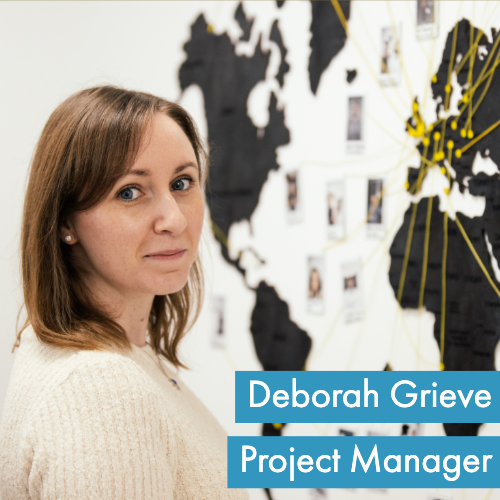How to build an award-winning team culture when your colleagues are never in the office
16 August 2019

Amido is officially one of the UK’s best places to work, despite many of their employees working off-site. We ask how they do it, and take a look at the science behind the strategy.

For better or worse, remote working has changed the game. We’re living through a seismic shift in working culture, with the ONS estimating that 50% of the UK’s workforce will be working remotely by 2020. And while benefits like increased flexibility and connectivity are a given, the age of remote work also presents a set of unique challenges for employers and employees alike.
Consultancies are right at the forefront of this change, which is what makes Amido, a cloud-native data-driven engineering company, so interesting. Despite the majority of their staff spending most of their time working with clients off-site, Amido’s unique office culture saw them voted one of the UK’s best places to work for 2019.
A little paradoxical? We thought so too. We head to Amido’s Shoreditch HQ to find out how you can foster an award-winning office culture when half the staff are never there.

Rule 1: Embrace technology (to an extent)
It’ll come as no great surprise that, at a tech company where colleagues aren’t often in the same room, staff have come to rely heavily on collaborative apps and tools.
“Being a tech company, we use every single platform,” says Abbie Lloyd, executive assistant to the leadership team. “We never stop messaging. We Slack each other. We leave voice messages via WhatsApp. And I’m a huge fan of Trello.”
Other people in the company cite Note, Jira and Teams as useful tools, but the most important bit of kit that keeps Amido’s staff in constant contact is one you might not expect. “We call each other all the time,” Abbie says. “Working in tech, with all these platforms, it’s really easy to become impersonal and out of touch. Speaking on the phone cuts through that.”
There’s strong science to back up this approach. UCLA emeritus Professor Albert Mehrabian famously theorised that only 7% of a message’s meaning is derived from words, with 38% coming from intonation. This suggests an over-reliance on emails, and that text can be good work’s worst enemy.

Rule 2: Nurture out-of-office relationships
It’s easy enough to expound the benefits of face-to-face contact, but with staff constantly working off-site, it’s often difficult for consultancies to make it work. Project manager Deborah Grieve believes the key doesn’t necessarily lie within the working day.
“We do company days, which are mandatory,” she says. These include sports events, the most recent of which was an all-staff bowling match. Amido also lays on a company breakfast every last Friday of the month, which staff members are encouraged to attend before heading off to their own client sites.
Most interesting, though, are Amido’s social communities, each of which is given a small budget (“for a round of drinks”), so that they can thrive outside of office hours. “There’s a football team, a lunchtime running club, even some sort of music-jamming club that’s just started,” Deborah says. “There’s a book club too, which I’m in, though it’s more of a cocktail-drinking club!”
All of this feeds into what Lynn Taylor, a noted author on HR issues, calls ‘smart camaraderie’ — that building a rapport with colleagues outside of work can actively contribute to achieving business goals. “Whether it’s a company picnic, outside meeting, company-sponsored event or business lunch, activities make your work interactions more enjoyable,” she tells Forbes. “[This] in turn boosts productivity: a win-win for you and the company.”

Rule 3: Respect the work/life balance
Ever since the beginnings of the tech boom and the time that ‘new businesses’ became ‘startups’, there’s been an idea that the best companies blur the boundaries of the work/life balance. Ping-pong tables, napping pods and pizza nights have become a tech sector cliché, and a means to dissuade those employees that do work in the office from ever leaving it.
That’s not a culture embraced at Amido. “I’ve been in the office at half-past five and Alan [Walsh, CEO] has come walking around saying, ‘Stop what you’re doing, it’s time to go,’” principal consultant Chris Priest says. “It’s important for that sort of message to be coming right from the top.”
With 61% of UK workers saying they feel they don’t have a good work/life balance, proactive top-down management on the subject is becoming ever more important. Long hours have been linked to numerous health risks while from a business perspective, researchers have found that a good work/life balance is key to reducing staff cynicism and increasing employee engagement.

Rule 4: Put your budget where your mouth is
Stagnation is one of the biggest threats to productivity and a healthy working culture, so it’s no surprise that according to the Independent, the UK’s best performing businesses put their employee’s learning and development at the very heart of their HR strategy. At Amido, this means a £2,000 budget for training every year for every employee.
Team members are encouraged to take courses together to facilitate the further growth of strong working relationships. These courses work on both a professional and a personal level, too — several staff members have recently been trained as mental health first aiders, an increasing trend in forward-thinking UK workplaces.
“We’ve just started a mental health committee,” Abbie explains. “People can come in for an off-the-record conversation if they’re struggling. They can map out local walks to clear their head, have their dog in the building, and we’re planning on meditation rooms too.”

Rule 5: Keep an open mind
Show and tell might seem more at home in primary school than a thriving tech business, but the science suggests it’s the perfect means for training up and bringing together a professional team. It’s the basis of Albert Bandura’s social learning theory — the idea that new behaviours are best learned in context, and can be acquired by observing and imitating others.
At Amido, this manifests in their monthly ‘lunch and learn’ sessions, in which office staff and those who work remotely can meet and share their passions and expertise.
“We’ve had people speak on some really interesting topics,” Chris says. “One guy did something about art, where he actually painted something while doing a talk. Someone else did one about dyslexia. And the next one is about particle physics.” The talks are even broadcast over Zoom, so people off-site can watch online and send in their questions.

Rule 6: Encourage conversation
If a good deal of your co-workers aren’t at the same desk every morning at 9am, it can be easy to lose touch, forget a name or — for those out of the office — feel like they’re not part of the business or company culture.
The answer, unsurprisingly, is making communication a priority.
“People who work in tech do have a reputation for being quite bad communicators,” Abbie says. “I worried about it before I started here because I’m quite chatty. Luckily, I was proven wrong.”
Abbie says the key to creating a conversation-friendly atmosphere is to break down classic barriers and hierarchies. “Everybody talks to each other here, whether in person or on a call. Anybody can ask anybody a question. You can just walk up to the CEO and have a conversation if you want to.”



